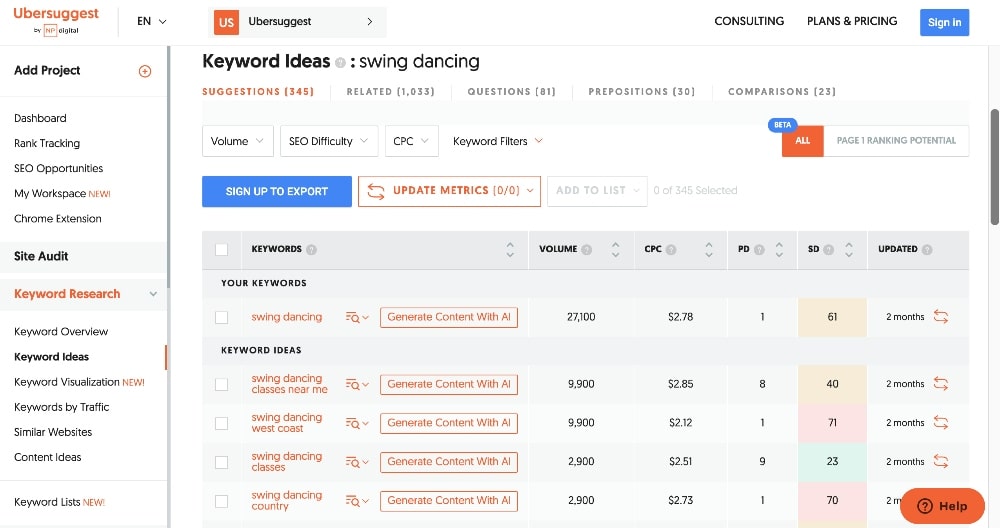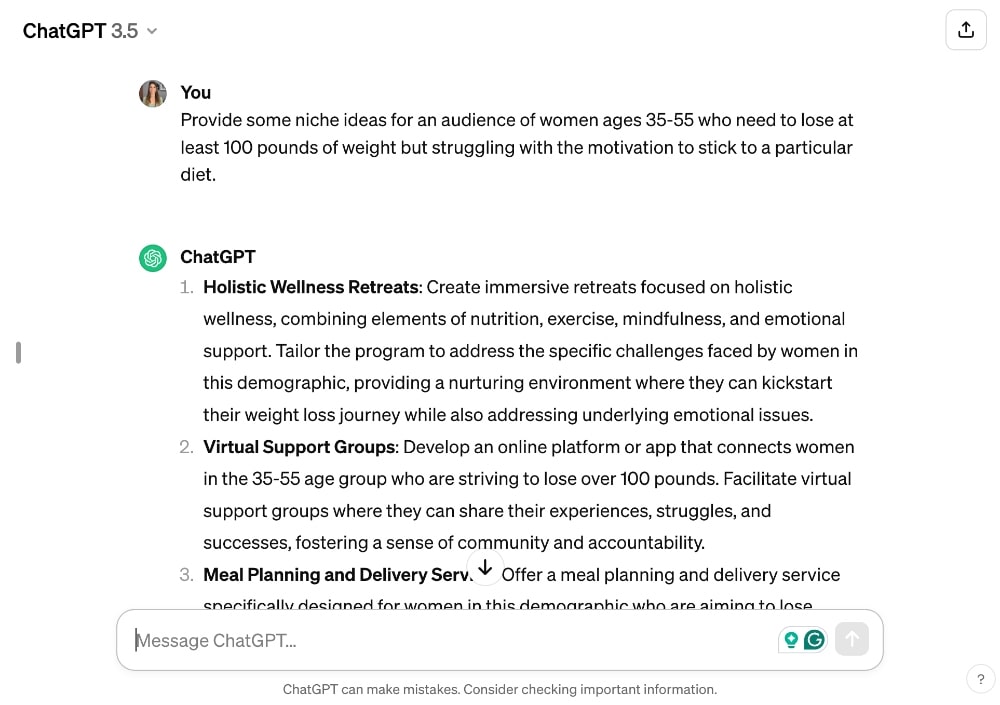Are you feeling ready to step into the online business world but aren’t sure how to choose your niche? Maybe you want to become a digital creator but you need a solid idea before you’re ready to take the leap?
We’ve got you. This is a problem that keeps a lot of people from just getting started, unfortunately. We don’t want that for you.
But it is important to choose a good niche market that allows you to create content freely and earn money.
A well-defined niche helps you stand out from the crowds and connect with the right people, but it can be hard to find that sweet spot—a niche that’s both personally rewarding and financially viable.
With our 8-step formula, you’ll be able to identify a business niche that aligns with your passions, skills, and market demand while also feeling confident that it provides the potential to earn some money.
Plus, if you’re feeling like your creativity levels are at an all-time low, we’ve included a list of 120 niche ideas to spark your creativity.
What is a Niche?
Before we dive into how to choose your niche market, let’s first define what exactly a niche is.
A niche is a specific area or topic within a larger market or industry that you will focus on in your business.
Having a niche allows you to target and connect with a specific audience who are interested in your particular content or products. This helps to build a loyal following and establish yourself as an authority figure in your particular niche.

But remember, choosing a niche doesn’t mean restricting yourself to only creating content related to that topic. You can always incorporate other topics or ideas into your content, as long as they fit within the overarching theme of your niche market.
Why is Choosing the Right Niche Important?
Now that we understand what a niche is, let’s talk about why it’s important to choose the right one for your business.
First and foremost, choosing the right niche market allows you to stand out from the competition. With so much content available online, having a specific niche helps you differentiate yourself and attract an audience that is interested in what you have to offer.
Additionally, by targeting a specific audience with a particular interest, you increase your chances of converting them into paying customers. This is because they are already interested in the type of content or products you offer.
Finally, a well-defined niche helps you stay focused and consistent with your content creation. When you have a clear idea of what your niche is, it becomes easier to come up with new ideas and keep your audience engaged.
What Niches Make Money?
Now, let’s address the big question: What niches are profitable and can help you make money?
The truth is, almost any niche can be monetized as long as there is an audience willing to pay for your content or products.
However, some niche businesses tend to be more profitable than others.
Some popular profitable niches include:
- health and wellness,
- personal finance,
- fashion and beauty,
- technology,
- travel,
- and education.
But don’t feel limited to just these niches. With the rise of the creator economy and online businesses, there is an audience for almost every niche market out there.
The key is to find a balance between personal interests, market demand, and financial viability.
8-Step Formula for Choosing Your Niche
Now that we understand the importance of choosing a niche, let’s dive into our 9-step formula for doing so.
1. Identify Your Interests and Skills
The first step to find your niche market is to identify your personal interests and passions. What topics do you enjoy learning about or talking about? What gets you excited and motivated?
Jot down a list of these interests and passions as they will serve as the foundation for your niche.
We don’t want to steer you on a path of deep soul-searching through the stars to find this. It should be a natural thing.
When you’re interested in a topic, you’re naturally more excited and motivated to create content about it. This makes starting, running, and growing your business infinitely easier.
Consider Your Skills and Expertise
Next, consider what skills or expertise you have that could be valuable in a niche. This could be anything from a hobby to a professional skill.
What are you good at? What knowledge or experience do you have that others might find valuable?
This could be professional skills or expertise or personal.
These skills can help narrow down your niche markets and also provide unique perspectives on your content.
For example, if you’re an experienced graphic designer, you may want to choose a niche market that allows you to showcase your design skills.
The Intersect of Passion and Profit
Combining your interests and skills will help you find the sweet spot for your business niche where you are both passionate and knowledgeable.
But that’s not all. We have to consider profits here. Look for niches where there is demand and a willingness to pay for your content or products.
This doesn’t mean you have to choose a niche solely based on its potential to make money, but it’s important to consider this factor as well.
Thinking about your knowledge and skills, are there any gaps in the current market that you could exploit with information and products?
2. Identify Potential Problems That Need Solving
Successful entrepreneurs are, by their very nature, problem-solvers.
Your niche idea, therefore, should present you with market-seeking solutions. That sounds very “markety,” so let me explain.
What problems are people facing in your niche?
This could be anything from a lack of information to a lack of products or services that cater to their specific needs.
By identifying these potential problems, you can position yourself as the solution and fulfill a need within your niche business.
Be Specific
When identifying problems, remember to be as specific as possible.
Don’t just focus on broad issues, but also look for niche-specific or niche-related problems.
- Bad Example: “Need to lose weight”
- Better Example: “Need to lose weight but struggling with the motivation to stick to a particular diet”
- Even Better Example: “Need to lose at least 100 pounds of weight but struggling with the motivation to stick to a particular diet”
The more specific the problem, the more targeted your content or product can be in addressing it.
3. Research Market Demand
To be successful, you need to ensure that there is demand for your niche market and that it’s financially viable.
Are there users or buyers actively seeking information or products related to your niche?
This means considering factors like:
- Market size: How many people are interested in this niche? Is the potential audience large enough to support your business?
- Saturated market: Is the niche oversaturated? Are there too many players already, making it difficult for new businesses to enter the market and make a profit?
Start by conducting keyword research using tools like Google Keyword Planner, Ubersuggest, SEMrush, or Ahrefs.
This will give you an idea of the search volume and competition for keywords related to your niche.

You can also use social media platforms like Twitter, Reddit, or Quora to see what people are talking about in potential niche markets.
While it’s important to find a niche with market demand, you also want to make sure that the market is large enough to sustain your business.
If there aren’t enough people interested in your niche business, it will be difficult to grow and monetize.
You can also look at existing businesses within your potential niches and see how successful they are. This will give you an idea of market saturation and competition.
4. Research Your Competition
It’s essential to research your competition and understand what they are offering in your niche.
This will help you understand the current market, identify any gaps or opportunities, and differentiate yourself from others in the same business niche.
Take note of their content, products, pricing, audience engagement, and marketing strategies.
Some key questions to ask when researching your competition include:
- What unique angle do they have in the niche?
- How are they differentiating themselves from others?
- What products or services do they offer?
- What is their pricing strategy like?
- How are they engaging with their audience?
- What marketing channels are they using to promote themselves?
Understanding your competition can help you identify gaps and opportunities within your business niche that you can capitalize on.
5. Narrow Down Your Niche
Narrowing down your niche is critical because it allows you to specialize in a particular area, making you an expert rather than a generalist. This focus helps in creating tailored solutions that hit the mark for a specific audience, which in turn breeds credibility and trust.
It also reduces competition, as you’re catering to a niche market rather than a broader market.
To narrow down your niche, start by analyzing your broad market to identify underserved segments.
You can use tools like Exploding Topics to explore recent trends and interests.

Engage with potential consumers through forums, social media, and surveys to get insights into their specific needs and pain points.
Another effective approach is to look at competitors and notice any demographic or interest groups they may be overlooking, thereby finding a gap in the market that your business could fill.
You should also examine your own personal interests and skills and consider how they align with these market opportunities.
One of the best ways to narrow down your business niche is to consider who your target audience might be.
Understand Your Target Market and Audience
Your target audience is the specific group of people you want to reach with your content or product. Understanding your target audience is crucial because it helps you create relevant and targeted content that resonates with them.
When narrowing down your niche, consider your audience’s demographics, interests and hobbies, values and beliefs, and problems and pain points.
- Demographics: Age, gender, location, income level
- Interests and Hobbies: What do they enjoy doing? What are their passions? What kind of lifestyle do they live?
- Values and Beliefs: What matters to them? What are their core values?
- Problems and Pain Points: What challenges do they face? What problems can you solve for them?
Identifying your target audience will also help you in creating a marketing strategy that reaches and engages with the right people.
You can also use an AI tool like ChatGPT to help you get ideas for your target audience:

Learning how to write better AI prompts will help you get better results from AI.
Real-World Example: Pickleball Blog
For example, I’m currently doing SEO on a blog focused on pickleball players who want to learn and improve their game. By understanding that our target audience consists of beginners and intermediate players seeking to level up their skills, we can create content that specifically addresses their needs—such as pickleball drills for beginners—rather than trying to appeal to all pickleball players. This focused approach helps us connect more deeply with our specific audience segment.
6. Evaluate Profit Potential (Monetization Strategies)
The ultimate goal of finding your niche is to build a profitable business.
Evaluate the profit potential of your business niche by considering different monetization strategies, such as:
- Affiliate marketing: Promoting products or services from other businesses and earning a commission for each sale made through your referral.
- Selling digital or physical products: Creating and selling your own products, such as ebooks, courses, or physical goods.
- Sponsored content: Collaborating with brands to promote their products or services through sponsored blog posts, social media posts, or videos.
- Advertising: Displaying ads on your website or in your content and earning revenue based on clicks or impressions.
- Membership/Subscription model: Creating a membership program where members pay a recurring fee for exclusive content or services.
Choose the monetization strategies that align with your niche and target audience.
For example, many successful fashion bloggers share affiliate links for popular fashion items like clothes, shoes, makeup, etc.

You may also want to consider diversifying your income streams to maximize revenue potential.
7. Consider the Potential for Growth
When choosing a niche, it’s essential to consider its potential for growth. You want to select a niche that has room for your business to expand and evolve over time.
Evaluate the market trends and projections when you’re looking to find your niche.
Is it a growing or declining market? Are there any emerging technologies or changes in consumer behavior that could impact the future of this niche?
Also, consider the scalability of your chosen niche. Can you easily add new products or services to cater to different audience segments?
Having a growth mindset and considering future opportunities can help ensure the long-term success of your business within your niche.
8. Define Your Unique Selling Proposition (USP)
Your unique selling proposition (USP) is what sets your business apart from others in your niche.
This is niche marketing 101.
It’s the value that you offer to your target audience that no one else does.
Defining your USP is crucial because it helps you stand out and attract target customers in a crowded market.
To define your USP, consider the following questions:
- What makes your business unique?
- What problems do you solve for your potential customers that others in the same niche don’t?
- How can you communicate this unique value to your target audience?
Once you’ve defined your USP, make sure to incorporate it into all aspects of your branding and marketing efforts.
120 Great Niche Ideas to Get You Started
If you’re still struggling to find your niche, here are 100 great niche ideas that you can use as inspiration.
Keep in mind that these niche ideas are pretty high-level, so you’ll want to narrow them down some before you get started.
Health and Wellness
Check out our list of top food blogs if you’re interested in this niche.
- Mental health and well-being – Providing resources and support for individuals struggling with mental health issues.
- Fitness and exercise – Focusing on a specific type of fitness, such as yoga, weightlifting, or HIIT workouts.
- Holistic health – Offering natural and alternative methods to improve overall wellness.
- Nutrition and healthy eating – Providing recipes, meal plans, and information on healthy eating habits.
- Chronic illness management – Catering to individuals with specific chronic illnesses and providing support and resources.
- Natural skincare and beauty – Offering natural and non-toxic products for skincare, makeup, or hair care.
- Pregnancy and postpartum – Providing resources and support for expectant or new mothers.
- Self-care and self-improvement – Focusing on personal growth, mindfulness, and self-care practices.
- Healthy aging – Catering to older adults and providing resources for healthy aging and longevity.
- Alternative medicine – Offering alternative methods of healing and treatment
Personal Finance
- Budgeting and frugal living – Providing tips and resources for budgeting, saving money, and living a frugal lifestyle.
- Investing and wealth-building – Offering educational resources and advice for building long-term wealth through investments.
- Debt management – Providing resources and support for individuals struggling with debt.
- Financial planning for retirement – Catering to individuals planning for their future and offering resources and advice on saving for retirement.
- Side hustles and entrepreneurship – Focusing on ways to make extra income through side hustles or starting a business.
- Financial education for children – Providing resources, activities, and tools to educate children about money management.
- Real estate investing – Offering resources and advice for individuals interested in investing in real estate.
- Taxes and accounting – Providing resources and support for tax preparation and understanding accounting principles.
- Credit repair and building – Offering resources and information on repairing credit or building credit from scratch.
- Financial independence/retire early (FIRE) – Catering to individuals looking to retire early and providing resources for achieving financial independence.
Lifestyle and Hobbies
Check out our list of top lifestyle blogs, top mom blogs, and top dad blogs if you’re interested in this niche.
- Travel and adventure – Focusing on a specific type of travel, such as budget travel, luxury travel, or solo travel.
- Parenting – Providing resources and support for parents at different stages of parenting.
- DIY and home improvement – Offering tutorials, tips, and inspiration for DIY projects and home improvement.
- Pet care and training – Catering to pet owners and providing resources for caring for pets.
- Gardening and sustainable living – Focusing on gardening, sustainable practices, and eco-friendly lifestyle choices.
- Fashion and style – Providing fashion inspiration, tips, and resources for individuals looking to update their style.
- Cooking or baking – Focusing on a specific type of cuisine or dietary restriction, such as vegan cooking or baking for beginners.
- Arts and crafts – Offering tutorials and resources for different types of arts and crafts projects.
- Meditation and mindfulness – Providing resources and support for individuals looking to incorporate meditation and mindfulness practices into their daily lives.
- Sports and fitness fanatics – Catering to fans of specific sports or fitness enthusiasts and providing resources, tips, and news related to their interests.
Business and Entrepreneurship
- Freelancing or consulting – Offering resources, advice, and support for individuals interested in freelancing or starting a consulting business.
- Digital marketing or social media management – Focusing on a specific aspect of digital marketing, such as SEO, email marketing, or social media management.
- E-commerce or dropshipping – Providing resources and advice for individuals interested in starting an online store or using dropshipping methods to sell products.
- Coaching or consulting for entrepreneurs – Offering coaching services or educational resources for aspiring entrepreneurs.
- Virtual assistance or project management – Catering to businesses and individuals in need of virtual assistance or project management services.
- Personal branding and career development – Providing resources and support for individuals looking to develop their personal brand or advance in their careers.
- Productivity and time management – Offering tips, resources, and tools for improving productivity and time management skills.
- Human resources and talent management – Providing resources and support for businesses looking to improve their human resources practices.
- Business coaching or mentorship – Offering coaching services or mentorship programs for individuals looking to start or grow their businesses.
- Investing in stocks or real estate for passive income – Focusing on different investment strategies and providing resources and advice for generating passive income through investing.
Technology and Gadgets
- Latest technology trends and gadgets – Providing updates on the latest tech trends, gadgets, and innovations.
- Gaming – Focusing on different types of gaming, such as console gaming, PC gaming, or mobile gaming.
- Smart home technology – Offering resources and reviews for smart home devices and integration.
- Cybersecurity and data privacy – Providing tips, resources, and advice for protecting personal information and staying safe online.
- Internet of Things (IoT) – Focusing on the impact and potential of IoT technology in everyday life.
- Artificial Intelligence (AI) – Exploring the capabilities and applications of AI in various industries.
- Augmented Reality (AR) and Virtual Reality (VR) – Offering insight into the world of AR and VR technology and its potential uses.
- Mobile apps – Providing reviews, recommendations, and resources for useful mobile apps in different categories.
- Wearable technology – Focusing on wearable devices and their impact on health, fitness, and daily life.
- Emerging technology – Exploring up-and-coming technologies and their potential impact on society and daily life.
Home Improvement and DIY
- Renovation and remodeling – Providing tips, resources, and inspiration for home renovation and remodeling projects.
- Interior design and decor – Offering ideas, trends, and advice for creating a stylish and functional living space.
- DIY furniture building – Providing tutorials, plans, and tips for building furniture from scratch.
- Gardening and landscaping – Offering advice, tips, and inspiration for creating a beautiful and functional outdoor space.
- Sustainable living at home – Focusing on eco-friendly practices and products for sustainable living in the home.
- Cleaning and organization – Providing tips, hacks, and products for keeping a clean and organized home.
- Home maintenance and repairs – Offering resources and advice for common home maintenance tasks and repairs.
- Seasonal decor and DIY projects – Providing ideas, tutorials, and inspiration for seasonal decorations and DIY projects.
- Home security and safety – Focusing on products, tips, and practices for keeping homes safe and secure.
- Budget home improvement – Offering tips, resources, and inspiration for home improvement projects on a budget.
Fashion and Beauty
Check out our list of top fashion blogs if you’re interested in this niche.
- Latest fashion trends and styles – Providing updates on the latest fashion trends, styles, and runway looks.
- Beauty tips and tutorials – Offering beauty tips, tricks, and tutorials for different makeup looks and skincare routines.
- Eco-friendly fashion and beauty products – Focusing on sustainable and ethical fashion and beauty brands or products.
- Fashion and beauty for different body types – Providing resources, advice, and inspiration for fashion and beauty for all body types.
- Hairstyling and haircare – Offering tips, tutorials, and trends for hairstyling and hair care.
- Nail art and nail care – Providing tutorials, designs, and products for creating unique and beautiful nail art.
- Personal style and self-expression – Encouraging individuals to embrace their own personal style and express themselves through fashion and beauty.
- Skincare routines for different skin types – Offering advice and product recommendations for skincare based on different skin types.
- Men’s fashion and grooming – Focusing on men’s fashion trends, styles, and grooming techniques.
- Affordable fashion and beauty – Providing tips, resources, and inspiration for affordable fashion and beauty options.
Travel and Adventure
Check out our list of top travel blogs if you’re interested in this niche.
- Top travel destinations – Offering recommendations and reviews for popular travel destinations around the world.
- Budget travel tips – Providing advice and resources for traveling on a budget without sacrificing experiences.
- Solo travel – Encouraging and providing resources for individuals interested in traveling solo.
- Adventure activities and extreme sports – Focusing on outdoor adventures and adrenaline-pumping activities such as hiking, bungee jumping, or skydiving.
- Cultural immersion and sustainable tourism – Educating readers on the importance of cultural immersion and sustainable tourism practices while traveling.
- Luxury travel – Offering recommendations and reviews for luxurious travel experiences.
- Travel photography tips – Providing advice, techniques, and resources for capturing stunning travel photos.
- Food and drinks around the world – Highlighting different cuisines, unique dishes, and popular beverages from various countries.
- Travel hacks and packing tips – Offering tips and tricks for efficient packing and making the most out of travel experiences.
- Volunteering and giving back while traveling – Encouraging readers to give back to local communities while traveling, offering resources and suggestions for responsible volunteering opportunities.
Personal Development
- Goal setting and productivity – Providing tips, resources, and strategies for setting and achieving goals.
- Self-care routines – Encouraging self-care practices and offering ideas for creating a personalized self-care routine.
- Time management and organization – Offering techniques and tools for effective time management and organization.
- Mindfulness and meditation – Educating readers on the benefits of mindfulness and offering resources for incorporating meditation into daily routines.
- Career development – Providing advice, resources, and inspiration for career growth and advancement.
- Emotional and mental well-being – Offering tips and resources for maintaining emotional and mental well-being.
- Financial planning and budgeting – Educating readers on the importance of financial planning and offering tips for creating a budget and managing finances.
- Relationships and communication – Providing advice, resources, and strategies for building and maintaining healthy relationships.
- Self-improvement challenges – Encouraging readers to take on self-improvement challenges such as reading more books or practicing gratitude.
- Personal growth through travel and new experiences – Highlighting the benefits of traveling and trying new things for personal growth and offering suggestions for meaningful experiences.
Pets and Animal Care
Check out our list of top pet blogs if you’re interested in this niche.
- Basic pet care – Providing essential information for taking care of common pets such as dogs, cats, and fish.
- Training and behavior – Offering tips and techniques for training and managing pet behavior.
- Health and wellness – Educating readers on how to keep their pets healthy through proper nutrition, exercise, and regular check-ups.
- Adoption and rescue – Encouraging adoption and providing resources for finding a new pet or supporting animal rescue organizations.
- Pet-friendly travel and activities – Offering ideas and recommendations for traveling with pets or participating in pet-friendly activities.
- Unique and exotic pets – Highlighting lesser-known types of pets such as reptiles, birds, and small mammals and providing information on how to care for them.
- DIY pet projects – Providing ideas and tutorials for creating fun and useful DIY projects for pets.
- Grooming and hygiene – Offering tips, techniques, and product recommendations for grooming different types of pets.
- Animal welfare and activism – Educating readers on animal welfare issues and promoting activism for animals in need.
- Bonding with pets – Encouraging readers to build strong relationships with their pets through activities, games, and quality time together.
Other Popular Niches
- Art and Culture – Providing reviews, interviews, and information on different forms of art, cultural events, and artists.
- Literature and Writing – Featuring book reviews, writing prompts, and tips for aspiring writers.
- Environment and Sustainability – Educating readers on environmental issues and providing tips for living a more sustainable lifestyle.
- Photography and Videography – Offering tutorials, tips, and inspiration for photography and videography enthusiasts.
- Technology and Gadgets – Highlighting the latest technology trends, gadgets, and providing reviews and recommendations.
- Music and Entertainment – Highlighting new music releases, interviewing artists, and providing reviews for concerts, movies, and TV shows.
- Education and Learning – Offering educational resources, tips for academic success, and information on different learning methods.
- Parenting and Family – Providing tips, advice, and resources for parents and families on various topics such as child development, relationships, and self-care.
- Video Games and Gaming – Providing reviews, news, and information on the latest video games and gaming trends.
- Religion and Spiritual Growth – Exploring different religions and spiritual practices, providing resources for personal growth and offering insights on faith.
FAQs About How to Choose a Niche
Next Steps After Choosing Your Niche
After you choose your niche, it’s important to develop a clear content strategy and create high-quality content that will attract and engage your target audience. Some key steps include:
- Conducting keyword research to optimize your content for search engines.
- Planning out a content calendar and consistently publishing valuable content.
- Engaging with your audience through social media, email marketing, and other channels.
- Collaborating with others in your niche to expand your reach and build relationships.
- Continuously analyzing and adjusting your content strategy based on data and feedback from your audience.
Remember that learning how to find your niche is just the beginning – it’s essential to continually adapt and evolve your approach as you establish yourself within the market.
Create Your Website
Once you’ve chosen your niche, one of the most crucial steps you can take is to start a website.
A website and/or blog is the foundation for your online business, providing a central hub where your audience can discover everything they need to know about what you offer.
This platform is the starting point for your platform and the place where you can establish your brand, showcase your content, and build credibility within your niche.
Starting a blog also opens up numerous opportunities for monetization, whether through selling products, affiliate marketing, or securing sponsorships.
Check out our step-by-step tutorial to get started!